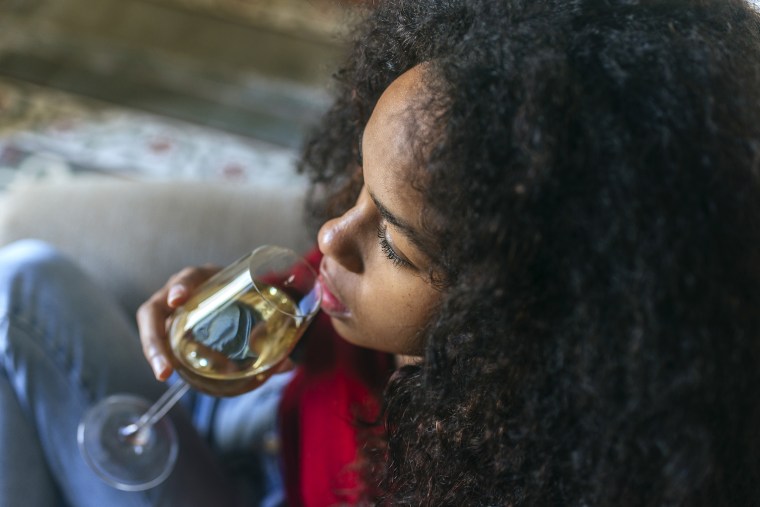Drinking alone in adolescence and young adulthood may be a “red flag” for alcohol problems later in life, especially for women, a new study has found.
Girls who drank alone were at particular risk of developing symptoms of alcohol abuse, dependence and addiction by the time they reached their mid-30s.
“We know that most young people, when they drink alcohol, they’re drinking with their friends at parties and socially. But there’s a pretty substantial minority that tell us they’re drinking alone,” Kasey Creswell, the lead study author and an associate professor of psychology at Carnegie Mellon University in Pittsburgh, Pennsylvania, told TODAY.
“We see a strong signal that drinking alone is worrisome and predicts problems… We think it’s because these kids are using alcohol as a way to cope with feeling down and depressed and lonely.”
That strong warning signal was there even when researchers controlled for other “robust risk factors,” such as binge drinking, frequent drinking and low socio-economic status, Creswell noted.
‘Perfect storm’ of problems
The study, published Monday in the journal Drug and Alcohol Dependence, was based on surveys completed by about 4,500 high school seniors from across the U.S. about their drinking habits, including how often they drank alone.
They were then followed for 17 years into adulthood, sharing more information about their alcohol use at age 23 or 24, and then again at 35. In that last survey, the participants were asked if their drinking caused any problems consistent with alcohol use disorder, such as alcohol interfering with their work or home life, or wanting to stop drinking but unable to.
About 25% of adolescents and 40% of young adults reported drinking alone. This study’s data collection stopped in 2019, but newer research shows there’s been an increase in solo drinking during the pandemic, plus an increase in depression and anxiety, Creswell said.
“It could create this perfect storm where people might be developing a problematic relationship with alcohol as a way to cope with those negative emotions,” she warned.
'Worrisome relationship with alcohol'
Researchers found the odds of experiencing symptoms of alcohol abuse at age 35 were 35% higher for adolescents who drank alone and 60% higher for young adults who drank alone, compared to people who imbibed in the company of others.
The likelihood of reporting severe alcohol abuse symptoms at age 35 was 59% higher for adolescent solitary drinkers and more than two times as high for young adult solitary drinkers, compared to social drinkers.
“Rather than using adaptive coping mechanisms like socializing with friends or going to parties or exercising, these kids are developing a really worrisome and problematic relationship with alcohol early on. We think that’s why it’s predictive of future problems,” Creswell noted.
Girls who reported drinking alone at 18 were at particular risk for alcohol abuse and dependency later in life, the researchers reported. Previous studies have found young men are more likely to engage in solo drinking, “so it could be that when young women are doing it, it’s a particularly stronger signal that something might be going awry,” Creswell said.
“Young women might be more reliant on alcohol to cope with negative emotions,” she added.
The findings come as a growing body of research points to particular concern about the impact of alcohol on women’s health.
Women absorb and metabolize alcohol differently than men, so the alcohol stays in a woman’s body longer, increasing the risk of liver disease, heart disease and certain cancers, Dawn Sugarman, a research psychologist in the division of alcohol, drugs and addiction at McLean Hospital in Belmont, Massachusetts, previously told TODAY.
When it comes to mental health, women already have twice the risk of men for depression and anxiety, and women are more likely than men to drink to cope with these negative feelings, she added.
Evaluating your relationship with alcohol
Since solo drinking in younger years appears to be such a red flag of alcohol problems later in life, simply asking young people if they’re drinking alone could identify those at risk and get them help earlier, the study authors noted.
Parents should talk to their teens about why they’re drinking alone, Creswell advised. If they’re feeling down or lonely, they could encourage them to talk to a trusted family member or friend, go outside to get some exercise or go to counseling.
Young adults who drink alone should take an honest look at their relationship with alcohol, she added.
Common questions to ask yourself include:
- Do I feel very possessive of alcohol and don’t want it taken away?
- Can I take a break from alcohol for a week or a month? If not, why not?
- Are friends and loved ones telling me they’re concerned about my drinking?
“Sipping a glass of wine with a nice dinner after work is not going to be problematic,” Creswell said.
“We really think the mechanism here is the use of alcohol to improve one’s mood… (to) rely on alcohol as a way to make themselves feel better.”

